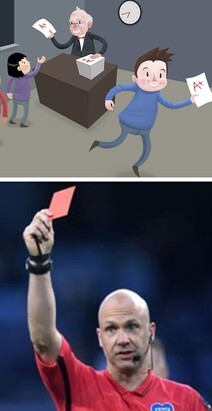
It is hard to imagine a lecturer bias. The grades of individual lecturers may exhibit a bias based on attendance, attractiveness, or identity, but it is hard to imagine a bias that is present in lecturers as a group. Yet, some of those same lecturers, when conducting research, will claim that other groups are biased in their assessments. Sports economists like to claim that sports referees are biased in favour of the home team. Those of the rational choice persuasion will claim that the referees consciously make these biased decisions; those of the behavioural economics persuasion will claim that the decisions are unconscious. Regardless of the decision making mode, it would be like researchers claiming that lecturers display a bias towards attendance, attractiveness, or identity.
A recent paper in Economic Inquiry by James Reade, Dominik Schreyer, and Carl Singleton uses data to show differences in outcomes in soccer games played with and without spectators. They then go on to claim that this shows that the referee is the primary channel through which social psychology works. A recent article in Frontier in Psychology is not convinced (and the authors do cite an earlier version of Reade et al). Let me borrow three sentences from Yannick Hill and Nico Van Yperen to illustrate their argument.
“Additionally, it should be noted that studies on the home field advantage typically lack actual behavioral indicators that are needed to test whether refereeing decisions are actually biased or not. Hence, in future studies, these behavioral indicators should be collected to test whether the “referee bias” actually represents biased decisions by referees ... An imbalance in the proportion of fouls or yellow and red cards does not necessarily represent biased decisions toward either the home or the away team, but accurate decisions to different behaviors displayed by the teams.”
A recent paper in the Journal of Economic Psychology threads a more nuanced line. The title of the paper uses the word “agents” – “Social pressure in the stadiums: Do agents change behavior without crowd support?” The author is Vincenzo Scoppa. Scoppa’s agents are players/team and referees. His measures include indicators of team performance and referee decisions. The paper shows that the measures, of both sets of agents, changed during the pandemic years.
One of my favourite papers on home bias is co-written by Scoppa. It is published in the Journal of Sports Economics and formed the basis of a previous post on this blog (here). This week I decided to investigate the author via Google Scholar. I discovered that Scoppa also conducts research on the Economics of Education. In fact, he has a 2022 paper titled “Online teaching, procrastination, and students’ achievements: evidence from COVID-19 induced remote learning”. The emphasis is clearly on the students (players). That is not to say that Scoppa et al do not consider the possibility of a lecturer (referee) bias. In the literature review they note of a previous paper “They also show that instructor-specific factors, such as leniency in grading due to a more compassionate approach towards students in response to the difficulties caused by the pandemic, play an important role and might lead to erroneously conclude that online teaching is better than face-to-face teaching.” But Scoppa’s paper clearly puts the emphasis on the students’ actions. Maybe sports economists should place more emphasis on the players.
 RSS Feed
RSS Feed